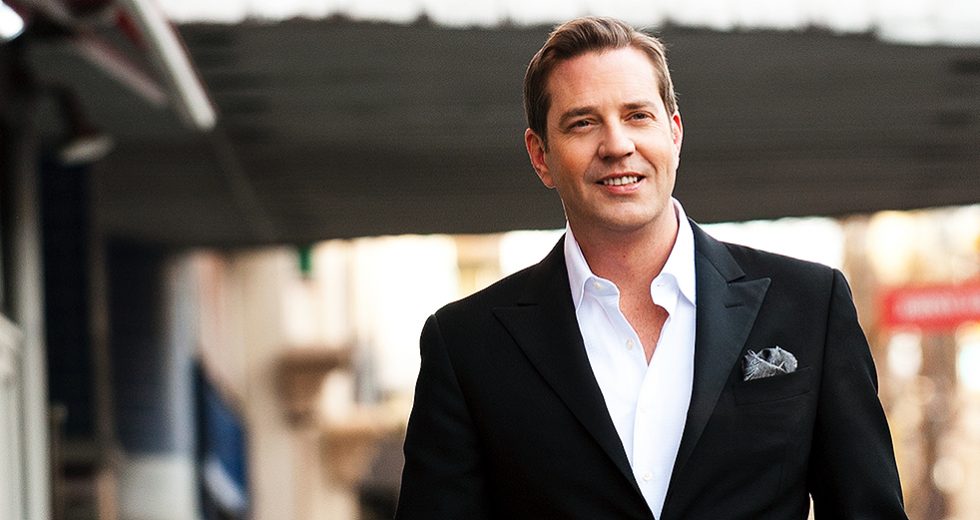
Although the Boston Pops Orchestra dates to 1885, it was Arthur Fiedler’s celebrated tenure as conductor from 1930 through 1979 that put it on the map. In many ways, he defined the pops idiom, which came to combine light classical music with other popular-music realms like jazz and Broadway. Fiedler also established the ever-popular tradition of the Fourth of July pops concert on the Boston Esplanade, which draws 200,000-500,000 people annually and is nationally broadcast.
Pops concerts spread across the United States, with orchestras large and small picking up on the idea, and according to conductor Steven Reineke, they remain as popular as ever. “If not more so,” he said from New York City. He ought to know, considering that he has served as music director of the New York Pops since 2009 and is principal pops conductor of the National Symphony Orchestra in Washington, D.C.; Houston Symphony, and Toronto Symphony.
At Ravinia, Reineke, 46, will lead the Chicago Symphony Orchestra in an Aug. 6 tribute to famed film and television composer Henry Mancini, known for such memorable tunes as the theme to “The Pink Panther” movies and “Moon River” from the classic film “Breakfast at Tiffany’s” (1961). While Mancini, who died in 1994, might not be familiar among millennials, older audiences remember him well. “This concert is really geared toward people who know who Henry Mancini was,” Reineke said, “so it will definitely skew to a little older demographic, but it’s such great music.”
Welz Kauffman, Ravinia’s president and chief executive officer, conceived the idea for the concert, and he tasked Reineke with coming up with the program, the conductor’s first entirely devoted to Mancini. Along with esteemed flutist Sir James Galway as soloist, the program will feature his wife, Jeanne Galway, also a flutist, and vocalists Tony DeSare and Ashley Brown, who has performed in “Show Boat” and “Oklahoma!” with Lyric Opera of Chicago and the CSO’s holiday revue “Merry, Merry Chicago.”
James Galway will be showcased in a range of works that Mancini arranged especially for him, including “Baby Elephant Walk” from “Hatari!” (1962), “Speedy Gonzales” from the television show “Mr. Lucky,” and “Pennywhistle Jig” from the film “The Molly Maguires” (1970) as well as “Cameo for James,” a tune written especially for the flutist. In addition, the program will include some of Mancini’s stand-alone novelty works, including “Overture to a Pops Concert.” “I didn’t know what that was,” Reineke said, “and I found it and gave it a listen and I said, ‘This is terrific.’ So that’s the way we’re going to start the show.”
It was a tough program to put together, the conductor said, because he had to uncover works that would make ample use of the four soloists and the orchestra, and some of the scores were not readily available. “I would find things on recordings,” he said, “and I’d say, ‘Where is that?’ And I would have to get the Chicago Symphony librarians on the task to do what they do best and that is track it down.”
An Ohio native, Reineke got his start when he was just 24 years old with the Cincinnati Pops Orchestra, which was founded in 1977 as an outgrowth of the Cincinnati Symphony. The orchestra gained worldwide recognition with its prolific, best-selling albums on the Telarc label under founding conductor Erich Kunzel. Reineke was hired in 1995 as the pops orchestra’s principal arranger and composer.
“The cool thing for me was that there was no other job like full-time that with any pops orchestra in the country,” he said. “Boston didn’t retain any full-time staff writers anymore like they once did. So when Erich offered me that job, I was living in Los Angeles trying to become a film composer, and I jumped at the chance.” He remained with the Cincinnati Pops until Kunzel’s death in 2009, taking the position of associate conductor about five years earlier.
In recent decades, Reineke said, the pops format has both remained the same and changed. Some of the veteran Broadway, jazz and big-band artists who were formerly featured on pops programs like vocalist Ella Fitzgerald have died, yet pops orchestras continue to do programs featuring her music. “So all that stuff we used to do is still going on, but we’ve just expanded the range of what we can do,” he said.
In addition to the old mainstays, pops orchestras have moved further into rock, country and bluegrass, with programs devoted to the likes of Pink Floyd and Led Zeppelin. Reineke has even done three or four pops concerts with the National Symphony Orchestra with hip-hop performers such as Kendrick Lamar and Common. “It has changed, because in the 1960s, ’70s and even ’80s, popular music was different than it was now,” he said.
Film music long has been part of pops concerts, but its popularity has skyrocketed in the last decade, with orchestras increasingly presenting screenings of complete films with the scores performed live. In 2004-05, after some earlier attempts in this format, the Chicago Symphony, established a series titled CSO at the Movies, with many of the concerts led by pops conductor Richard Kaufman, who has an extensive Hollywood background. Featured in 2017-18 will be concerts of “Harry Potter and the Sorcerer’s Stone” (2001) and “Singin’ in the Rain” (1952) and the highlights program “John Williams Returns.”
One constant in pops programs is the need for compelling, first-rate arrangements — known as “charts” — that make substantial use of the orchestra. “It is the key to all of it,” Reineke said. “It is has to be well written for the orchestra and it has to be collaborative. There is nothing worse than putting stupid, amateurish charts in front of a great professional orchestra. They hate it. But if it’s well done and well-crafted, the orchestra musicians get it and they enjoy it.”